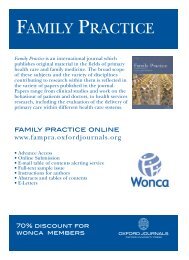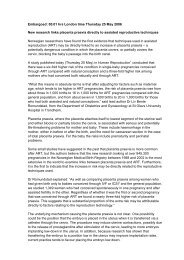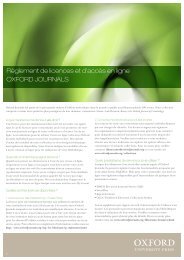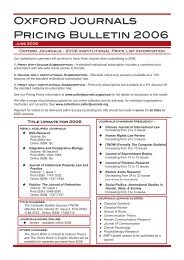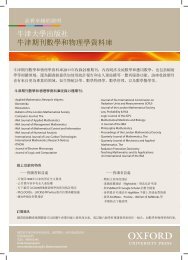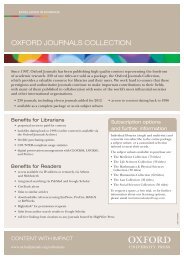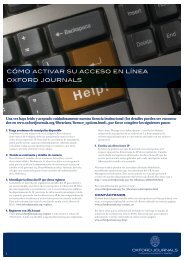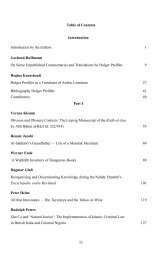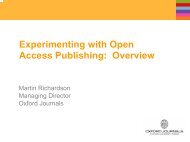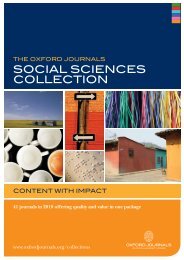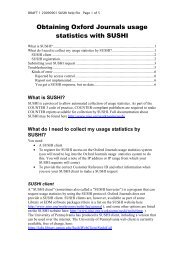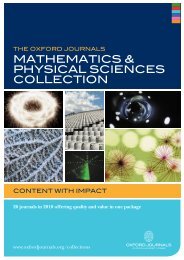Download the ESMO 2012 Abstract Book - Oxford Journals
Download the ESMO 2012 Abstract Book - Oxford Journals
Download the ESMO 2012 Abstract Book - Oxford Journals
You also want an ePaper? Increase the reach of your titles
YUMPU automatically turns print PDFs into web optimized ePapers that Google loves.
plus intravenous Bev(7.5mg/kg q 21d) for 12/12. This abstract overviews <strong>the</strong> final<br />
toxicity data (15/12 minimum follow up per patient) from <strong>the</strong> Q2 trial.<br />
Results: 1952 patients were consented and randomised and, after excluding patients<br />
who did not receive at least one cycle of treatment, 963 patients receiving Cape alone<br />
and 959 patients receiving Cape plus Bev were analysed. Baseline characteristics<br />
(gender / age / stage of disease) were balanced across <strong>the</strong> 2 arms. See frequency of<br />
selected toxicities, as % patients, in table below.<br />
Discussion: As expected, <strong>the</strong> rates of hypertension (all grade or high grade) and<br />
proteinuria and wound healing (all grade) were significantly higher among patients<br />
receiving Bev. Although <strong>the</strong> addition of Bev did not increase diarrhoea rates, <strong>the</strong><br />
frequency and severity of HFS was increased. This is not well recognised. Although<br />
cardiac chest pain was not increased by <strong>the</strong> addition of Bev, both arterial and venous<br />
thrombo-embolism (ATE/VTE) rates were increased although <strong>the</strong> difference only<br />
reached significance for VTE in this study. This is in contrast to most results in <strong>the</strong><br />
advanced disease setting and may be a result of an interaction between post-operative<br />
risk of VTE and pro-thrombotic potential of Bev. Of note, an excess of ‘possibly<br />
treatment-related’ deaths was found in patients receiving Bev (1.9% vs 0.8%:RR2.3:CI<br />
1.0-5.2) and this just reached significance (p = 0.05). All results will be expanded in<br />
detail in <strong>the</strong> presentation / poster.<br />
Cape/ Bev Cape RR/CI/p<br />
Hypertension (all grades) 33.4 7.8 4.3/3.4-5.4/p < 0.001<br />
Hypertension (g3/4) 3.8 0.6 6.0/2.6-14.2/p < 0.001<br />
Proteinuria (all grades) 20.5 5.1 4.0/3.0-5.4/p < 0.001<br />
Poor wound healing (all grades) 3.1 1.8 1.8/1.0-3.2/p = 0.05<br />
Diarrhoea (g3/4) 10.8 10.6 1.0/0.8-1.3/p = 0.9<br />
Hand-foot syndrome (g3/4) 26.8 20.9 1.3/1.1-1.5/p = 0.002<br />
Cardiac chest pain SAE 2.7 2.6 1.0/0.6-1.8/p = 0.9<br />
Arterial Thromboembolism SAE 1.1 0.6 1.8/0.7-5.0/p = 0.2<br />
Venous Thromboembolism SAE 4.3 2.3 1.9/1.1-3.1/p = 0.01<br />
Disclosure: R.S. Midgley: Au<strong>the</strong>r has received no strings attached educational<br />
unrestricted grant for clinical research and has sat on advisory boards for Roche.<br />
V. Potter: Au<strong>the</strong>r has received a travel grant and has sat on an advisory board for<br />
ROche. E. Segelov: Author has sat on an advisory board for Roche Autralia.<br />
D.R. Ferry: Au<strong>the</strong>r has received travel grants, research grants and has sat on advisory<br />
boards for Roche. S. Grumett: Au<strong>the</strong>r has received traval grants and has sat on<br />
advisory boards for Roche. D.J. Kerr: Au<strong>the</strong>r has received no strings attached<br />
educational unrestricted grant for clinical research and has sat on Advisory Boards<br />
for ROche. All o<strong>the</strong>r authors have declared no conflicts of interest.<br />
531P SHOULD PALLIATIVE RESECTION OF PRIMARY TUMOR BE<br />
PERFORMED IN PATIENTS WITH ADVANCED COLORECTAL<br />
CANCER? A SYSTEMATIC REVIEW & META-ANALYSIS<br />
S. Ahmed 1 , R.K. Shahid 2 , A. Leis 3 , K. Haider 1 , P. Pahwa 3<br />
1 Medical Oncology, Saskatoon Cancer Centre University of Saskatchewan,<br />
Saskatoon, SK, CANADA, 2 Medicine, University of Saskatchewan, Saskatoon,<br />
SK, CANADA, 3 Community Health & Epidemiology, University of Saskatchewan,<br />
Saskatoon, SK, CANADA<br />
Background: Colorectal cancer (CRC) is a leading cause of cancer death. Surgical<br />
resection of <strong>the</strong> primary tumor in patients with advanced CRC remains controversial.<br />
Limited data is available regarding potential benefits and risk of primary tumor<br />
resection in such patients.<br />
Objectives: To compare survival of patients with advanced CRC who underwent<br />
surgical resection of primary tumor with patients without resection. The review also<br />
aims to determine post-operative mortality & non-fatal complications rates, primary<br />
tumor complications rate (PTCR), non-resection surgical procedures rate (NSPR)<br />
and quality of life (QOL).<br />
Methods: A literature search was conducted by using CENTRAL (<strong>2012</strong>), Medline<br />
(1946-<strong>2012</strong>), and EMBASE (1947-<strong>2012</strong>). Selection Criteria: Studies involving patients<br />
with advanced colorectal adenocarcinoma who underwent primary tumor resection<br />
were selected using pre-specified eligibility criteria with restriction to publication<br />
dates from 1980, English language and human studies. Data Collection and analysis:<br />
Screening, evaluation of relevant articles and data abstraction was done in<br />
duplication and agreement was assessed. Articles that met <strong>the</strong> inclusion criteria were<br />
assessed for quality by using Ottawa-Newcastle score. Data was collected and<br />
syn<strong>the</strong>sized as per protocol.<br />
Results: Of total of 3379 reports, 15 retrospective observational studies were selected<br />
with patients population of 12456. Among 12456 patients, 8620 (69%) underwent<br />
surgery with a median overall survival of <strong>the</strong> 15.2 months (range: 10-30.7) compared<br />
with 11.4 months (range: 3-22) of <strong>the</strong> non-resection group. Hazard ratio (HR) for<br />
survival was 1.44 (95% CI: 1.26-1.64) favoring surgical intervention. Mean 30 days<br />
post-operative mortality and non-fatal complications rates were 4.9% (95% CI: 0-9.7)<br />
& 25.9% (95%CI: 20.1-31.6) respectively. Mean PTCR & NSPR in <strong>the</strong> control group<br />
were 29.7% (95%CI: 18.5-41.0) and 27.6% (95 CI: 15.4-39.9) respectively. No study<br />
provided QOL data. Sub-group analysis that were defined a priori revealed HR of<br />
1.46 (95% CI: 1.20-1.78) favoring surgical intervention in patients treated with<br />
modern chemo<strong>the</strong>rapy.<br />
Conclusions: The retrospective data favors primary tumors resection in advanced<br />
CRC. Future prospective randomized trials are warranted to confirm <strong>the</strong> findings.<br />
Disclosure: All authors have declared no conflicts of interest.<br />
532P PTEN AND ADVANCED COLORECTAL CANCER (CRC):<br />
ANALYSIS FROM THE PHASE III AGITG MAX TRIAL OF<br />
CAPECITABINE ALONE OR IN COMBINATION WITH<br />
BEVACIZUMAB +/- MITOMYCIN C<br />
T. Price 1 , J. Hardingham 1 , C. Lee 2 , A. Townsend 1 , J. Wrin 1 , K. Wilson 2 ,<br />
A. Weickhardt 3 , R.J. Simes 2 , C. Munroe 3 , N. Tebbutt 4<br />
1 Department of Medical Oncology, The Queen Elizabeth Hospital, Woodville<br />
South, SA, AUSTRALIA, 2 CTC, University of Sydney, Sydney, NSW,<br />
AUSTRALIA, 3 Oncology, Ludwig Institute, Melbourne, VIC, AUSTRALIA,<br />
4 Medical Oncology, Austin Hospital, Heidelberg, VIC, AUSTRALIA<br />
Background: The tumour suppressor gene PTEN may have a role as a biomarker for<br />
anti-EGFR <strong>the</strong>rapy in CRC. As PTEN expression also has a relationship with VEGF<br />
expression via HIF-1 alpha, and <strong>the</strong> PI3K/mTOR pathways, we have explored <strong>the</strong><br />
potential that PTEN loss may be predictive of outcome with an anti-VEGF agent. We<br />
also assess <strong>the</strong> prognostic value of PTEN as this remains controversial.<br />
Methods: Patients enrolled in <strong>the</strong> Phase III MAX trial of capecitabine (C) +/bevacizumab<br />
(B) (+/- mitomycin C (M)) with available tissues were analysed for<br />
PTEN expression (loss v no loss) as assessed using a Taqman® copy number assay to<br />
measure copy number variation at <strong>the</strong> PTEN locus. The predictive value of PTEN<br />
status for bevacizumab efficacy was examined. PTEN status was also correlated with<br />
progression-free survival (PFS) and overall survival (OS) outcomes, and a second sub<br />
analysis grouping PTEN by KRAS/BRAF status was also performed.<br />
Results: Of <strong>the</strong> original 471 patients enrolled in <strong>the</strong> trial, tissues from 302 (64.1%)<br />
patients were analysed. Baseline characteristics of those with and without tissues were<br />
comparable. PTEN loss was observed in 38.7% of patients. There was no relationship<br />
between PTEN loss and KRAS or BRAF mutation (KRAS/BRAF MT v WT with<br />
PTEN loss; 34%/37% v 41%/39% respectively). PTEN loss was associated with rectal<br />
primary (p = 0.01) and lower rates of lung metastasis (p = 0.03). By using <strong>the</strong><br />
comparison of C v CB + CBM, PTEN status was not significantly predictive of <strong>the</strong><br />
effectiveness of B for PFS or OS (Table). PTEN status is also not prognostic for PFS<br />
or OS in multivariate analyses adjusting for o<strong>the</strong>r baseline factors (Loss v No Loss<br />
PFS HR 0.9 (0.7-1.16), OS HR 1.04 (0.79-1.38)). PTEN was also not prognostic when<br />
assessed by KRAS and BRAF status.<br />
Conclusions: PTEN status did not significantly predict different benefit with<br />
anti-VEGF <strong>the</strong>rapy. PTEN status was not prognostic for survival in advanced<br />
colorectal cancer.<br />
C vs CB + CBM Loss No loss P value (for interaction)<br />
PFS HR 0.51 0.33 - 0.79 HR 0.72 0.52-0.98 P = .26<br />
OS HR 0.75 0.47-1.19 HR 1.00 0.70-1.43 P = .35<br />
Disclosure: T. Price: Uncompensated Advisory board Merck, AMGEN and Roche.<br />
Travel grants Merck and AMGEN. N. Tebbutt: Uncompensated Ad board Roche. All<br />
o<strong>the</strong>r authors have declared no conflicts of interest.<br />
533P SOMATIC K-RAS MUTATION IS PREDICTIVE IN COLORECTAL<br />
CANCER, BUT IS IT PROGNOSTIC? A SYSTEMATIC REVIEW<br />
AND META-ANALYSIS<br />
I.B. Tan, T. Seah, S.L. Koo, S. Choo, C.K. Tham, D. Chong<br />
Medical Oncology, National Cancer Centre, Singapore, SINGAPORE<br />
Annals of Oncology<br />
Background: Consistent data from retrospective molecular analysis performed in<br />
multiple phase 3 Randomized controlled trials (RCTs) have established that somatic<br />
KRAS mutation (K-RAS-mt) is a strong predictor of non-response to anti-epidermal<br />
growth factor receptor antibody (anti-EGFR) <strong>the</strong>rapy in colorectal cancer. However,<br />
K-RAS’s role as a prognostic marker remains undefined. We performed a systematic<br />
review and meta-analysis to determine <strong>the</strong> prognostic significance of somatic K-RAS<br />
mutation.<br />
Methods: We searched MEDLINE, EMBASE, and CENTRAL databases, <strong>ESMO</strong> and<br />
ASCO meeting proceedings for Phase 3 RCTs in colorectal cancer for which<br />
retrospective molecular analysis of K-RAS mutation was performed on archival<br />
patient samples. Studies were pooled according to setting of treatment (adjuvant, 1 st<br />
line metastatic, refractory). Meta-analysis was performed using random-effects model.<br />
The outcomes of interest were disease-free survival in <strong>the</strong> adjuvant setting and<br />
overall survival (OS) for advanced disease.<br />
Results: 14 Phase 3 trials which enrolled 18,991 patients were identified, of whom<br />
13,143 had K-RAS status ascertained (69.2% range: 48%-100%) In pooled data of<br />
ix182 | <strong>Abstract</strong>s Volume 23 | Supplement 9 | September <strong>2012</strong>



